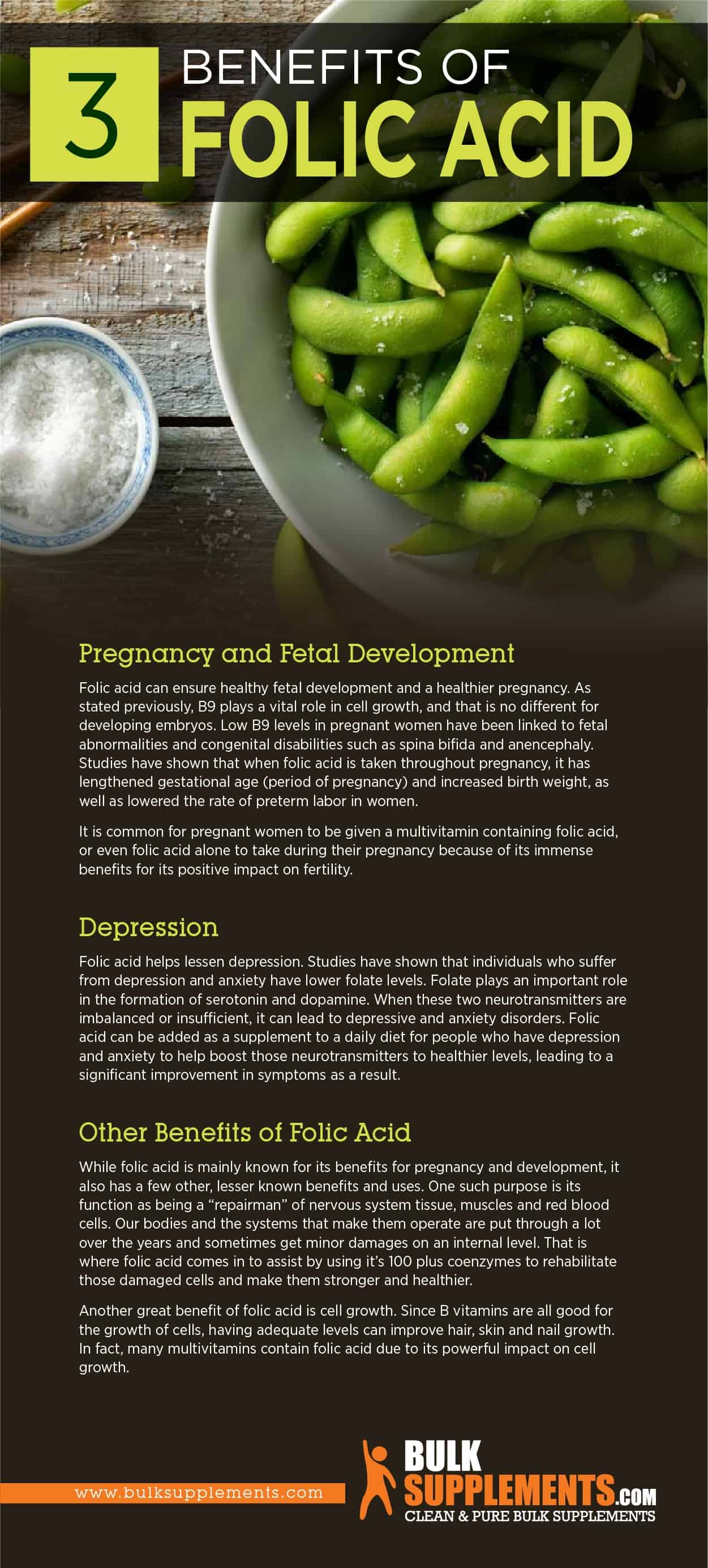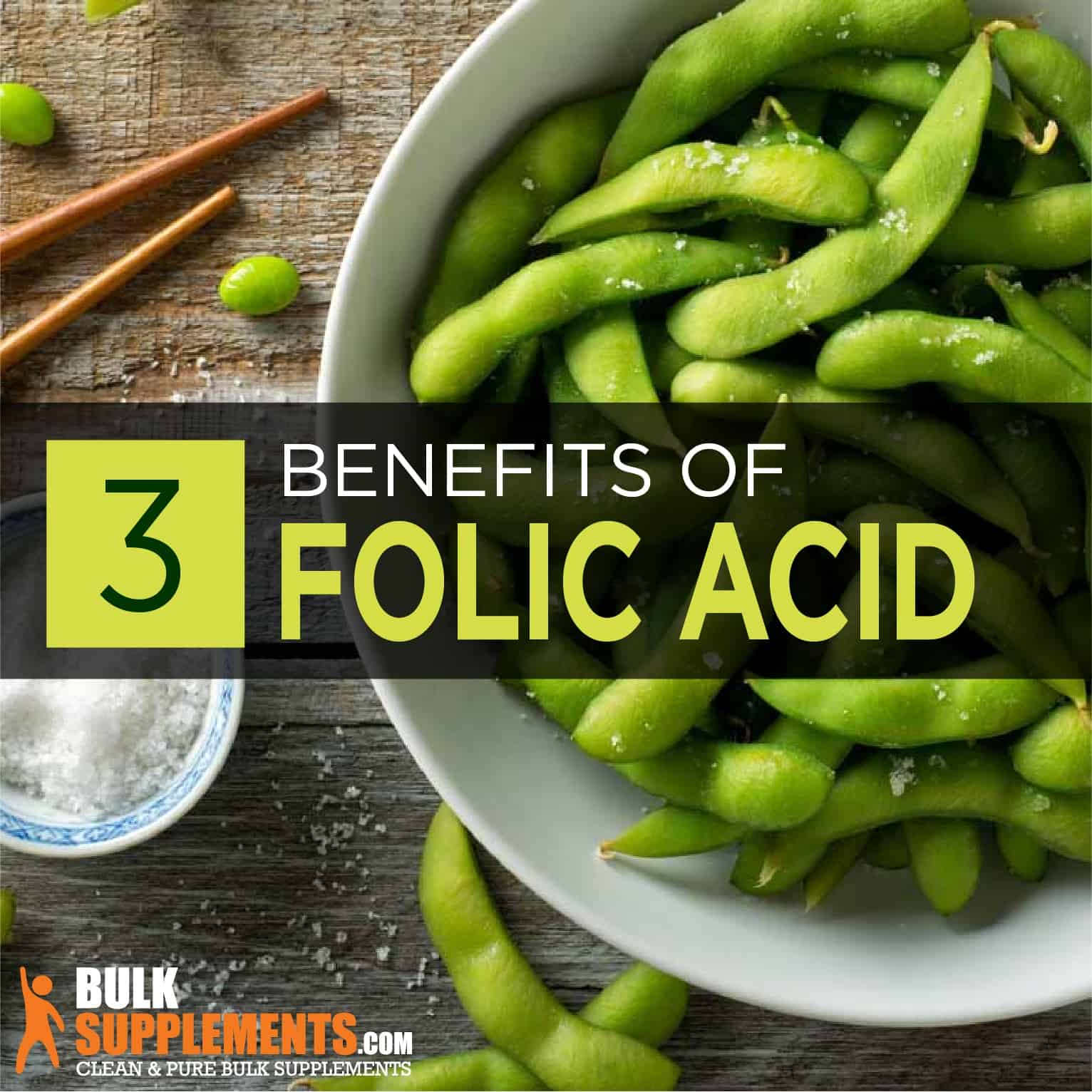What is Folic Acid (Vitamin B9)?
A specific form of vitamin B9, folic acid, helps your red blood cells build and repair themselves. The nutrient is not a natural form of vitamin B9. It’s a synthetic version, unlike another form of vitamin B9 — folate, which naturally occurs in food.
Difference Between Folic Acid and Folate
Though folate is another type of vitamin B9, it has distinct differences compared to folic acid. Because their names are interchangeable, this causes much confusion, even professionally. The simple way for you to distinguish between the two is that folate, a B9 vitamin, is naturally in foods. Folic acid is a B9 vitamin that is not naturally in foods. Rather than it is a synthetic form of the vitamin. (x)
Since the late 90s, manufacturers have added folic acid to foods. You may have seen labels on food products that say “fortified with” folic acid. The fortification usually means the food product doesn’t naturally have folate, vitamin B9, bread, crackers, cereals and baking flours. Foods that already have folate in their chemical makeup do not get folic acid added. These foods include dark, leafy greens, fruits, okra, beans and meat. (x)
As with most naturally occurring vitamins, it is always better for your body to get the natural form of vitamin B9 (folate) rather than the synthetic kind (folic acid). However, folic acid of any form can be hugely beneficial for people who have a folate deficiency. It’s a solution for those regions where people lack natural vitamin B9 or those who need to increase their vitamin B9 intake to prepare for pregnancy or while pregnant.
How Folic Acid Impacts the Body
To best understand what folic acid is and how it impacts the body, you need to first start by understanding the influence, both good and bad, that vitamin B9 holds for your body.
Vitamin B9
Your body needs vitamin B9, a water-soluble, essential vitamin and nutrient, to function correctly. It assists with the development of red blood cells, DNA and RNA. It works to form blood cells within the bone marrow, as well as ensures rapid cell growth in fetuses, infants and teens. The European Food Safety Authority (EFSA) established the dietary intake of vitamin B9 in relation to its overall health benefits. These include: (x)
- Proper blood formation
- Adequate homocysteine levels (high levels of homocysteine relate to the early development of heart and blood vessel disease)
- Healthy metabolism of the immune system
- Robust cell division
- Strong maternal tissue growth during pregnancy
- Amino acid synthesis within normal parameters
- Normal psychological functions
- Combats tiredness and fatigue
Folic Acid
If you have low blood levels of folate or want to prevent low folate levels from occurring, use folic acid supplements. Low levels could be because of the presence of anemia (a condition where blood lacks enough red blood cells) or your body cannot absorb enough nutrients from the red blood cells.
How the Body Assimilates Folic Acid
Folic acid reacts differently compared to its natural counterpart, folate. When you take the supplement, it takes more time for the body to convert all of it to the active form of vitamin B9. Unlike folate, which is absorbed and converted in the digestive system, folic acid must go through its conversion in the liver and other tissues of the body. The cycle does not lessen the positive impact that the supplement has on your body. It merely means that because it is a distinct form of folate, the body digests it differently.
Folic Acid Benefits and Uses
Understanding the benefits and uses of folic acid helps you see the importance of taking the supplement. Some include:
- Pregnancy and Fetal Development
Folic acid can ensure healthy fetal development and healthier pregnancy. As stated previously, B9 plays a vital role in cell growth, and that is no different for developing embryos. Low B9 levels in pregnant women may cause fetal abnormalities and medical conditions present at births such as spina bifida (incomplete closing of the spine) and anencephaly (large part of the skull absent). Studies have shown that when taken throughout pregnancy, it has lengthened gestational age (period of pregnancy) and increased birth weight, as well as lowered the rate of preterm labor in women. (x) (x)
It is common for doctors to prescribe pregnant women a multivitamin containing folic acid or even folic acid alone to take during their pregnancy because of its immense benefits and positive impact on fertility.
- Cause of Depression
Folic acid helps lessen depression. Studies have shown that individuals who suffer from depression and anxiety have lower folate levels. Folate plays a vital role in the formation of serotonin and dopamine. When these two neurotransmitters are imbalanced or insufficient, it can lead to depression and anxiety disorders. You can add folic acid as a supplement to a daily diet for people who have depression and anxiety to help boost those neurotransmitters to healthier levels, leading to a significant improvement in symptoms as a result. The course of treatment is far better than the atrocities of the psychiatric industry, over drugging instead of discovering the actual cause of the problem — nutritional deficiency. (x)
- Other Benefits of Folic Acid
While we mainly know folic acid for its benefits for pregnancy and fetus development, it also has a few other lesser-known benefits and uses. One such purpose is its function as a “repairman” of nervous system tissue, muscles and red blood cells. Your body and systems that make them operate go through a lot over the years and sometimes get minor damages on an internal level. That is where it comes in to assist your body by using its 100 plus coenzymes to rehabilitate those damaged cells and make them stronger and healthier — metabolic processes. (x)
- Cell Growth
Another significant benefit of it is cell growth. Since B vitamins are all good for the development of cells, having adequate levels can improve hair, skin and nail growth. In fact, many multivitamins contain folic acid because of its powerful impact on cell growth.

Vitamin B9 in Foods
If you are less than thrilled at the idea of taking the synthetic version of vitamin B9, it is not vital that you do. It is reasonably easy to get the daily required amount of B9 via natural ways. That way, you will consume the nature-grown folate form of B9, not folic acid. Below is a list of folate-rich foods that you can add to your daily diet:
- Broccoli
- Avocados
- Lettuce (or any leafy green)
- Oranges
- Lentils
- Bananas
- Asparagus
- Whole Wheat flour
- Melons
- Brussels sprouts
Folic Acid Deficiency
If you are deficient in vitamin B9, it means that there is not enough folate or folic acid in your body. Whether that is because of a diet lacking in B9-rich foods or because your body cannot adequately process B9 properly, it can cause long-lasting side effects if not addressed. Anemia is the more prominent issue that arises from deficiency, as well as depression, memory and brain function problems, possible bone weakening and other health concerns.
B9 deficiency is typically an easy problem to avoid. Of course, it depends on one having a balanced diet or adding a daily supplement of folic acid.
Where to Buy Folic Acid Supplements?
You can purchase folic acid at BulkSupplements.com. The company is an industry-leading manufacturer and distributor of pure dietary supplements.
BulkSupplements.com is not just a consumer brand. It also supplies pure ingredients to other food and supplement brands to make their products. All products at BulkSupplements.com are manufactured and tested according to current and proper manufacturing practices.
Are you interested in trying folic acid supplements for your health, as described in this article? Contact BulkSupplements.com to place an order today.
Folic Acid Side Effects
Generally, folic acid supplements are safe to take. Even the rare side effects of taking too much are minimal. As long as the daily dose remains under 1,000 mcg daily, side effects are unlikely to occur.
The unlikely, minor side effects that can occur are as follows:
Keep in mind that folic acid is a water-soluble substance, so your body quickly eliminates it from the body via urinary excretion. For this reason, it makes the risk of toxicity very low.
How Much Folic Acid Should You Take?
When supplementing with folic acid powder, take no more than 500 mcg to 1 mg daily. Store the powder in a dry and cool location. Of course, be sure to speak to a medical professional before adding this supplement to your regimen.
The Bottom Line
Folic acid is an essential part of keeping your body functioning. Luckily, many foods have natural folate or folic acid-fortified. It is incredibly easy to get what we need from these foods.
Taking too much folic acid can have side effects, though it is a water-soluble supplement. Your body usually eliminates vitamin B9 before it can adversely affect your body.
Healthcare providers strongly encourage women who want to become pregnant or are pregnant to add more folic acid to their diets. Adding it to your diet has proven incredibly beneficial to a healthy pregnancy and a healthy baby.
As always, it is essential to discuss with a medical professional about adding any supplement to your diet.
These statements have not been evaluated by the Food and Drug Administration. These products are not intended to diagnose, treat, cure or prevent any disease.


